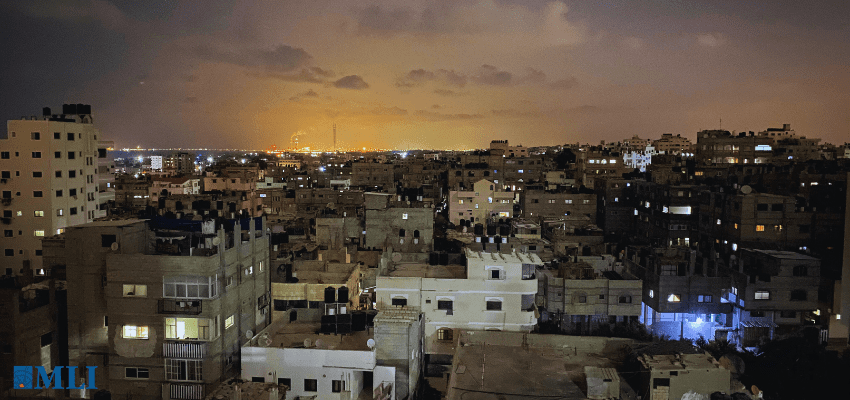This article originally appeared in the National Post.
By Casey Babb, May 29, 2024
Throughout history, decisive battles have fundamentally altered the direction of global peace and security. Waterloo, Stalingrad, Normandy, Fallujah, Mosul and many others are reminders that bloody battles within broader wars have become defining moments in human history — moments with profound political, economic, military and social repercussions.
Today, in Gaza, another battle with equally consequential effects is brewing: the battle of Rafah. While most people understand the fate of Rafah as one primarily linked to civilian casualties, the long-term impacts of Israel’s ability to successfully carry out military operations there will have dramatic ramifications around the globe. Canada and its allies need to wake up to these realities — and fast.
For starters, Israel’s primary objective in conducting large-scale military operations in Rafah is annihilating the remaining Hamas battalions entrenched in the densely populated city, while securing the release of the remaining 121 hostages — whether they be dead or alive.
If countries like Canada, the United States, Britain and Australia continue restricting Israel from liberating the city on its own terms, Hamas will inevitably regain control over Gaza. Not only would this complicate any future peace-building plans in Gaza, it would guarantee the continued subjugation of Palestinian civilians to Hamas’s brutality and barbarism, while also enabling the terrorist group to plan and conduct another October 7-style assault in the future.
In addition, proponents of a potential two-state solution, regardless of its unlikelihood, need to realize that any scenario in which Hamas governs Gaza all but guarantees Israel’s refusal to entertain the idea of a Palestinian state — and understandably so.
Hamas and the many other terrorist organizations operating along Israel’s borders are laser-focused on their commitment to destroy the Jewish state. Equipping them with all that statehood entails is entirely off the table until a more moderate governing body can be put in place — one that at the very least recognizes Israel’s right to exist. Anything short of that would be a disaster.
Internally, the damage to Israel itself could be just as bad. Since October 7, the country has become terribly divided as its fragile government worsens a grieving national psyche still in shock from the historic trauma it endured, and continues to endure, from the attacks last fall.
If Israel is prevented, either directly or indirectly, from destroying Hamas, killing or capturing its leaders and rescuing the hostages, the sense among Israelis that they are not allowed to win a war and defend themselves could endure for generations, crippling the country’s political, social, cultural and military fabric.
The long-term consequences of Hamas regaining control over Gaza would be remarkably bad for international security, as well. From Boko Haram and al-Qaida, to ISIS-K and al-Shabaab, the deadliest and most inhumane terrorist groups on the planet will learn from Hamas, becoming increasingly emboldened and empowered, knowing full well that should they adopt the same cowardly tactics that Hamas used, they too can survive.
Even dictators like Russian President Vladimir Putin and Syrian President Bashar aAssad, who are engaged in deadly drawn-out battles, could learn from Hamas, using human shields, taking hostages and embracing guerrilla-like tactics when it suits them. This would be a nightmare for militaries and counter-terrorism forces around the world, including Canada’s, which will inevitably find themselves on the front lines in future conflicts.
As Israeli Prime Minister Benjamin Netanyahu declared, “If you want peace, destroy Hamas. If you want security, destroy Hamas. If you want a future for Israel, the Palestinians (and) the Middle East, destroy Hamas.” For all his faults — and there are many — Netanyahu is right.
Countries around the world, including Canada, have become fixated on Rafah, rightfully focusing on the risk of civilian deaths. The May 26 Israeli strike, for instance, which reportedly killed dozens of civilians, along with multiple senior Hamas officials, illustrates precisely why so many are concerned for civilian safety. However, it also illustrates once again what little value Hamas places on human life — and how cowardly and barbaric its practice of hiding among civilians truly is.
When Canada’s foreign minister stated that an invasion of Rafah would be “completely unacceptable,” she not only signalled to Israel that it is held to an entirely different standard than every other country on earth, she signalled to Hamas that its destruction is off limits — that it will live to see another day.
If Canada and its allies truly cared about peace in the region, if they truly cared about Israelis and Palestinians living side-by-side in peace, they would take it upon themselves to have more difficult discussions, to support challenging and even controversial decisions, and to unequivocally condemn the terrorists — not those who seek to remove them.
Casey Babb is a senior fellow at the Macdonald-Laurier Institute in Ottawa, a fellow with the Institute for National Security Studies in Tel Aviv and an associate fellow with the Royal United Services Institute in London. He teaches courses on terrorism and international security at the Norman Paterson School of International Affairs in Ottawa.






